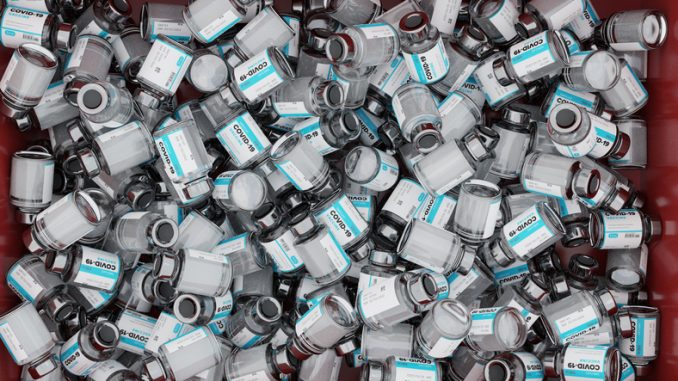As reported by The Pharmaceutical Journal, in its annual report and accounts, NHS England said that keeping the vaccines in storage would not equate to value for money owing to running costs
NHS England has written off almost £5m worth of COVID-19 vaccines that cannot be used because they are surplus to requirement and will cost too much to be stored.
In its annual report and accounts for 2022/2023, published on 25 January 2024, NHS England listed a “constructive loss” of £4.8m from stock that was “procured as part of the Vaccine Deployment Programme in response to the COVID-19 pandemic”.
“The stock was procured in extreme urgency and considerable uncertainty in supply chains and demand,” the report said.
“The stock is now deemed as surplus to requirement and retaining the stock in storage will not equate to value for money when compared to the running cost of storage.”
In November 2022, the government reported that almost 7 million doses of COVID-19 vaccine had been recorded as wasted, expired or damaged as of July 2022, including 5.04 million doses recorded as waste by vaccination sites and fewer than a million doses recorded as waste, expired or damaged by wholesale partners.
The figures were published in response to a report by the House of Commons Committee of Public Accounts, ‘The rollout of the COVID-19 vaccine programme in England’.
The Department of Health and Social Care said at the time that the level of waste was “significantly lower than the initial planning assumption of 15–20% total wastage” and that “the government has implemented an integrated business planning process to ensure supply risks are accounted for, contingency measures identified, and forecast demand is met as closely as possible” to reduce waste.
Commenting on the £4.8m write-off, Leyla Hannbeck, chief executive of the Association of Independent Multiple Pharmacies, said: “It was clear throughout the pandemic and beyond that the culture of secrecy, of knee-jerk reactions and silo thinking, was not the best way for NHS officials to get vaccines into the arms of those that needed it.
“There needs to be open consultation with all those on the front line, including patient-facing professions, such as community pharmacy, to get the best results from the taxpayers money.”
The roll out of COVID-19 vaccines began on 8 December 2020, when Margaret Keenan, aged 90 years, received the world’s first COVID-19 vaccine at University Hospital in Coventry, West Midlands.
Community pharmacy involvement followed in January 2021, when the first six community pharmacies across the country started administering COVID-19 vaccinations.
More than 3,500 pharmacies in England later registered to provide vaccinations for the 2023 autumn booster programme, which ended on 31 January 2024.




Be the first to comment